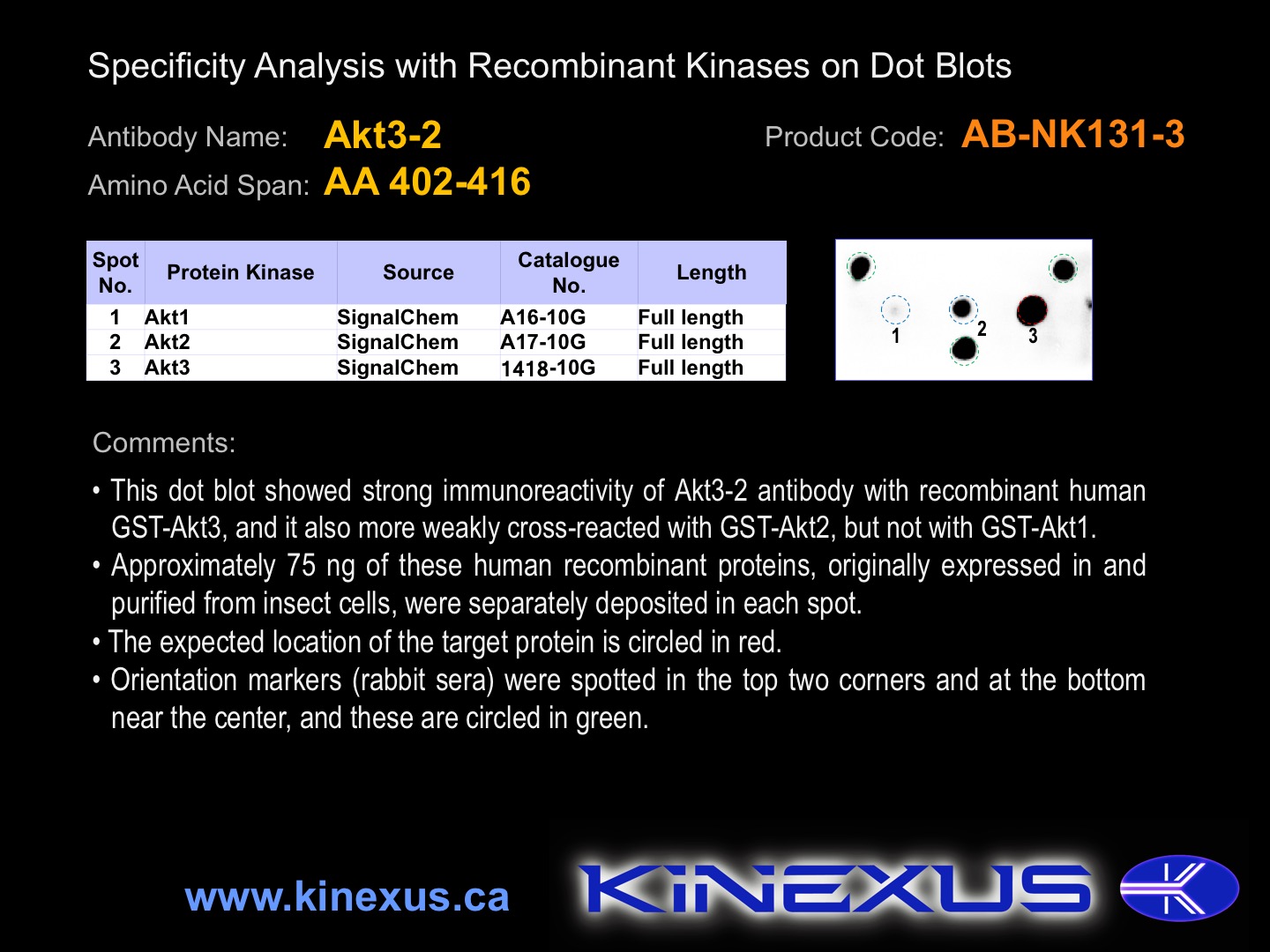Product Name: Akt3-2
Product Number: AB-NK131-3
| Size: | 25 µg | Price: | 89.00 | |
| $US |
Target Full Name: RAC-gamma serine/threonine-protein kinase
Target Alias: Akt3; Kinase Akt3; PKB gamma; PKBG; PRKBG; Protein kinase Akt-3; Protein kinase B, gamma; RAC-gamma; V-akt murine thymoma viral oncogene 3; RAC-gamma serine,threonine protein kinase; RAC-gamma serine/threonine protein kinase; RAC-PK-gamma; STK-2; DKFZp434N0250; ENSG00000117020
Product Type Specific: Protein kinase pan-specific antibody
Antibody Code: NK131-3
Antibody Target Type: Pan-specific
Protein UniProt: Q9Y243
Protein SigNET: Q9Y243
Antibody Type: Polyclonal
Antibody Host Species: Rabbit
Target Alias: Akt3; Kinase Akt3; PKB gamma; PKBG; PRKBG; Protein kinase Akt-3; Protein kinase B, gamma; RAC-gamma; V-akt murine thymoma viral oncogene 3; RAC-gamma serine,threonine protein kinase; RAC-gamma serine/threonine protein kinase; RAC-PK-gamma; STK-2; DKFZp434N0250; ENSG00000117020
Product Type Specific: Protein kinase pan-specific antibody
Antibody Code: NK131-3
Antibody Target Type: Pan-specific
Protein UniProt: Q9Y243
Protein SigNET: Q9Y243
Antibody Type: Polyclonal
Antibody Host Species: Rabbit
Antibody Immunogen Source: Human Akt3 (PKBg) sequence peptide Cat. No.: PE-01AWT99
Antibody Immunogen Sequence: CHSFFSGVNWQDVYDK
Antibody Immunogen Description: Corresponds to amino acid residues H402 to K416; Post-kinase last alpha-chain
Antibody Immunogen Sequence: CHSFFSGVNWQDVYDK
Antibody Immunogen Description: Corresponds to amino acid residues H402 to K416; Post-kinase last alpha-chain
Production Method: The immunizing peptide was produced by solid phase synthesis on a multipep peptide synthesizer and purified by reverse-phase hplc chromatography. Purity was assessed by analytical hplc and the amino acid sequence confirmed by mass spectrometry analysis. This peptide was coupled to KLH prior to immunization into rabbits. New Zealand White rabbits were subcutaneously injected with KLH-coupled immunizing peptide every 4 weeks for 4 months. The sera from these animals was applied onto an agarose column to which the immunogen peptide was thio-linked. Antibody was eluted from the column with 0.1 M glycine, pH 2.5. Subsequently, the antibody solution was neutralized to pH 7.0 with saturated Tris.
Antibody Modification: Unconjugated. Contact KInexus if you are interest in having the antibody biotinylated or coupled with fluorescent dyes.
Antibody Concentration: 1 mg/ml
Antibody Modification: Unconjugated. Contact KInexus if you are interest in having the antibody biotinylated or coupled with fluorescent dyes.
Antibody Concentration: 1 mg/ml
Storage Buffer: Phosphate buffered saline pH 7.4, 0.05% Thimerasol
Storage Conditions: For long term storage, keep frozen at -40°C or lower. Stock solution can be kept at +4°C for more than 3 months. Avoid repeated freeze-thaw cycles.
Product Use: Western blotting | Antibody microarray
Antibody Dilution Recommended: 1 µg/ml for immunoblotting
Antibody Potency: Very strong immunoreactivity with recombinant human Akt3 on protein dot blots.
Antibody Species Reactivity: Human; Mouse
Antibody Positive Control: The observed molecular mass of the processed target protein on SDS-PAGE gels is reported to be around 55-60 kDa.
Storage Conditions: For long term storage, keep frozen at -40°C or lower. Stock solution can be kept at +4°C for more than 3 months. Avoid repeated freeze-thaw cycles.
Product Use: Western blotting | Antibody microarray
Antibody Dilution Recommended: 1 µg/ml for immunoblotting
Antibody Potency: Very strong immunoreactivity with recombinant human Akt3 on protein dot blots.
Antibody Species Reactivity: Human; Mouse
Antibody Positive Control: The observed molecular mass of the processed target protein on SDS-PAGE gels is reported to be around 55-60 kDa.
Antibody Specificity: High
Antibody Cross Reactivity: Medium immunoreactivity on protein dot blots with recombinant human Akt2, and no immunoreactivity with recombinant human Akt1
Related Product 1: Akt3-2 blocking peptide
Related Product 2: AktSubtide - Akt1 (PKBa) protein kinase substrate peptide
Related Product 3: GSK3b (3-12) KinSub - Glycogen synthase kinase 3-beta (GSK3b) N-terminus (G3-E12, human) peptide; Akt protein kinase substrate peptide
Antibody Cross Reactivity: Medium immunoreactivity on protein dot blots with recombinant human Akt2, and no immunoreactivity with recombinant human Akt1
Related Product 1: Akt3-2 blocking peptide
Related Product 2: AktSubtide - Akt1 (PKBa) protein kinase substrate peptide
Related Product 3: GSK3b (3-12) KinSub - Glycogen synthase kinase 3-beta (GSK3b) N-terminus (G3-E12, human) peptide; Akt protein kinase substrate peptide
Scientific Background: Akt3 (PKBG, PRKBG) is a protein-serine/threonine kinase of the AGC group and Akt family. Akt3 appears to be an oncoprotein (OP) based on its similarity to Akt1 and Akt2, although it does not display a higher than normal rate of mutation in human tumours. The active form of the protein kinase normally acts to promote tumour cell proliferation. Akt3 has been implicated as a key modulator in several human cancer types, including melanomas, gliomas, ovarian cancer, and breast cancer. Expression levels of Akt3 have been shown to increase throughout the course of melanoma tumour progression, peaking in advanced-stage metastatic melanomas. Mutations in the Akt3 gene have been observed in several melanoma cell lines, including an activating E17K substitution mutation similar to that seen in the Akt1 gene in human colorectal cancers. However, the E17K mutation is relatively rare in Akt3 in human tumours. Moreover, like Akt2, there are no predominent mutations in Akt3 in human cancers, with a relatively dispersed pattern of low level mutations through out the full length of the protein. Along with Akt2, Akt3 is also important in the formation and progression of glioblastomas. In addition, a fusion gene involving Akt3 has been identified in breast cancer tissue samples. The MAGI3/Akt3 fusion gene was recurrently identified in triple-negative breast cancer specimens, which lack estrogen receptors, progesterone receptors, and ERBB2 expression. The fusion gene results in constitutive activation of the Akt3, and suppresses apoptosis and stimulates aberrant cell growth and enhanced survival. Insertional mutagenesis studies in mice support a role for this protein kinase in mouse cancer oncogenesis.
© Kinexus Bioinformatics Corporation 2017


